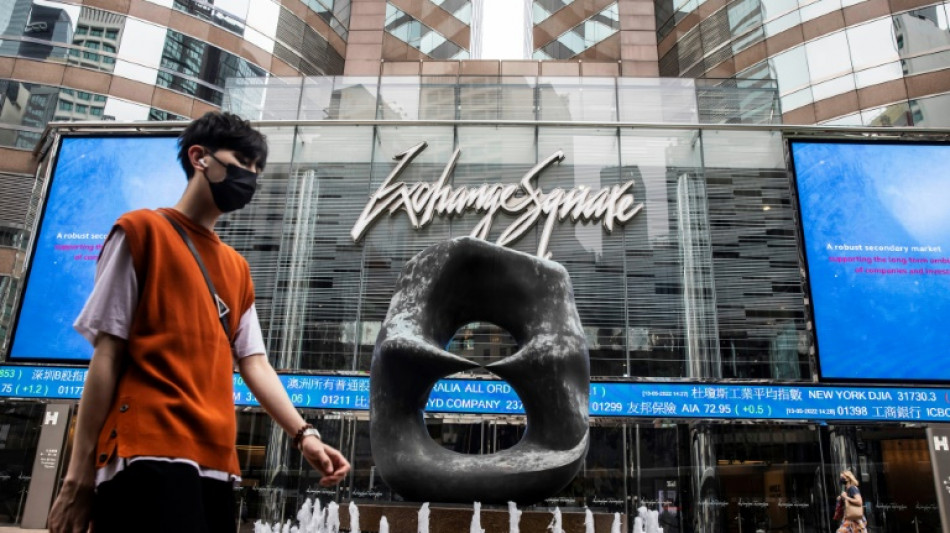
| NGG | -3.3% | 56.13 | $ | |
| SCS | -3.01% | 10.97 | $ | |
| RIO | 0.36% | 58.84 | $ | |
| VOD | -1.99% | 8.05 | $ | |
| BTI | -2.34% | 35.9 | $ | |
| RBGPF | 100% | 60.49 | $ | |
| BP | 0.54% | 31.29 | $ | |
| GSK | -1.99% | 33.09 | $ | |
| RYCEF | -0.42% | 7.07 | $ | |
| CMSC | -0.79% | 22.92 | $ | |
| BCC | -1.31% | 115.88 | $ | |
| BCE | -2.92% | 22.96 | $ | |
| RELX | -0.86% | 46.37 | $ | |
| CMSD | -0.65% | 23.25 | $ | |
| JRI | -1.16% | 12.08 | $ | |
| AZN | 0.64% | 67.01 | $ |

Markets dive on inflation woes as dollar spikes against yen, rupee
Markets tumbled in Asia and Europe on Monday to extend a global rout while the dollar soared after a forecast-beating US inflation print ramped up bets on a more aggressive campaign of Federal Reserve interest rate hikes.
Fresh Covid outbreaks in Shanghai and Beijing have also seen authorities reimpose containment measures soon after lifting them, leading to fears about the world's number two economy.
The possibility of more restrictions in China's biggest cities weighed on oil prices, with concerns about a possible US recession and the stronger dollar adding to downward pressure on the black gold.
Investors were left surprised Friday when data showed US inflation jumped 8.6 percent in May, the fastest pace since December 1981, as the Ukraine war and China's lockdowns pushed up energy and food prices.
The reading has led to fervent speculation that the Fed will now be contemplating a 75 basis point lift in interest rates at some point, though it is still expected to stick to a flagged half-point hike when it meets this week.
With the central bank forced to be more aggressive, there is a concern that the US economy could be sent into recession next year.
"For the last few weeks, there has been a cautious calm in markets -- rates not pricing anything unforeseen, and equities able to make small gains," said SPI Asset Management's Stephen Innes.
"But the strength of (US consumer prices) completely upended that apple cart.
"The market is now thinking much more about the Fed driving rates sharply higher to get on top of inflation and then having to cut back as growth drops."
And Bank of Singapore chief economist Mansoor Mohi-uddin added that officials would likely lift borrowing costs 50 basis points for the next four meetings and eventually push the overall rate to 4.0 percent in 2023.
- Rupee hits record low -
Wall Street's three main indexes tanked, with the Nasdaq taking the heaviest blow as tech firms -- which are susceptible to higher rates -- were battered, while European markets were also hammered.
Asia followed suit, with Hong Kong, Tokyo, Mumbai, Jakarta, Taipei, Wellington, Shanghai, Singapore, Manila and Bangkok all taking a beating.
And Europe joined the retreat with London losing more than one percent as data showed the UK economy shrank for the second month in a row in April. Frankfurt and Paris were also deep in the red during morning trade.
Goldman Sachs analysts said in a note: "At some point financial conditions will tighten enough and/or growth will weaken enough such that the Fed can pause from hiking.
"But we still seem far from that point, which suggests upside risks to bond yields, ongoing pressure on risky assets, and likely broad US dollar strength for now."
The dollar continued to push higher on expectations for a sharp increase in US rates, hitting a 24-year peak of 135.19 yen while it also broke above 78 Indian rupees for the first time.
The greenback was also at multi-year highs on the euro and sterling.
"The ongoing backdrop to the yen's fall is the growing gap between long-term interest rates in Japan and the United States," Takahide Kinouchi, executive economist at Nomura Research Institute, said in a recent commentary.
But the head of the Bank of Japan remained steadfast in sticking to its policies, saying last week that "monetary tightening is not at all a suitable measure" for Japan, whose economy is still recovering from the pandemic.
Questioned in parliament on Monday, Haruhiko Kuroda said: "The recent rapid depreciation of the yen increases uncertainties and means companies face difficulties in drafting business plans, thus it is negative for the economy and not desirable."
Oil prices sank, extending Friday's retreat, on demand concerns as China sticks to an economically damaging zero-Covid policy to fight a fresh outbreak of the disease.
Parts of Shanghai were put back into lockdown and officials carried out mass testing on millions of people, just weeks after lifting strict measures in the country's biggest city.
The uncertainty has also hit Bitcoin, with the cryptocurrency falling below $25,000 for the first time since the end of 2020.
- Key figures at around 0810 GMT -
Tokyo - Nikkei 225: DOWN 3.0 percent at 26,987.44 (close)
Hong Kong - Hang Seng Index: DOWN 3.4 percent at 21,067.58 (close)
Shanghai - Composite: DOWN 0.9 percent at 3,255.55 (close)
London - FTSE 100: DOWN 1.2 percent at 7,230.38
Dollar/yen: UP at 134.60 yen from 134.42 yen late Friday
Euro/dollar: DOWN at $1.0465 from $1.0526
Pound/dollar: DOWN at $1.2240 from $1.2309
Euro/pound: UP at 85.51 pence from 85.39 pence
Brent North Sea crude: DOWN 1.7 percent at $119.95 per barrel
West Texas Intermediate: DOWN 1.7 percent at $118.60 per barrel
New York - Dow: DOWN 2.7 percent at 31,392.79 (close)
Y.Simon--JdB



